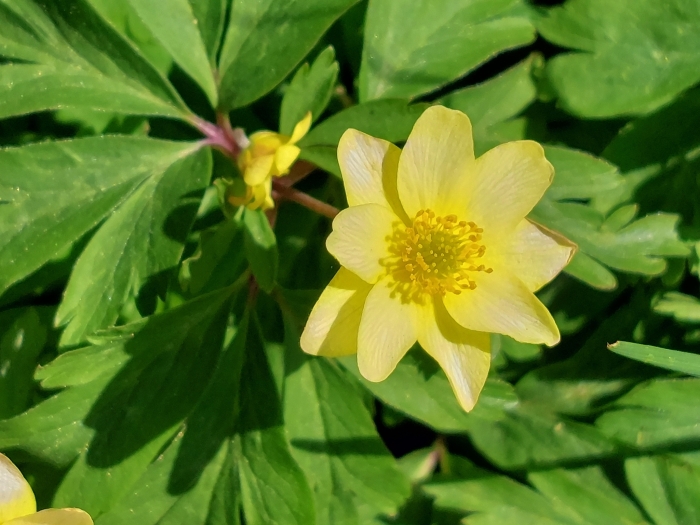Wood Anemone
(Anemone ×lipsiensis)
Wood Anemone (Anemone ×lipsiensis)
/
/

nuujaka
CC BY 4.0
Image By:
nuujaka
Recorded By:
Copyright:
CC BY 4.0
Copyright Notice:
Photo by: nuujaka | License Type: CC BY 4.0 | License URL: http://creativecommons.org/licenses/by/4.0/ | Rights Holder: nuujaka | Publisher: iNaturalist | Date Created: 2023-05-12T14:01:48-07:00 |


















Estimated Native Range
Summary
Anemone × lipsiensis, commonly known as Wood Anemone or Windflower, is a hybrid perennial herb that is a cross between Anemone nemorosa and Anemone ranunculoides. It is native to deciduous woodlands and forest clearings in Europe, where it thrives under a canopy of trees. The plant typically grows at a moderate rate to a height and width of 0.5-1 feet (0.15-0.3 meters). Wood Anemone features delicate, cup-shaped yellow flowers that bloom in early to mid-spring, providing a showy display that is particularly striking when planted in mass. The foliage is deeply lobed and provides a textural contrast in garden settings.
Wood Anemone is valued for its springtime blooms and its ability to naturalize in woodland garden settings, creating a carpet of color. It is commonly used in shaded borders, underplanting for deciduous trees, and in naturalized areas where it can spread over time. This plant prefers part shade but can tolerate morning sun if the soil remains moist. It thrives in medium draining loam or clay soils with a consistent supply of moisture during the growing season. While generally low-maintenance, it can be susceptible to leaf miners and rust. Gardeners should be aware that all parts of the plant are toxic if ingested.CC BY-SA 4.0
Wood Anemone is valued for its springtime blooms and its ability to naturalize in woodland garden settings, creating a carpet of color. It is commonly used in shaded borders, underplanting for deciduous trees, and in naturalized areas where it can spread over time. This plant prefers part shade but can tolerate morning sun if the soil remains moist. It thrives in medium draining loam or clay soils with a consistent supply of moisture during the growing season. While generally low-maintenance, it can be susceptible to leaf miners and rust. Gardeners should be aware that all parts of the plant are toxic if ingested.CC BY-SA 4.0
Plant Description
- Plant Type: Herb
- Height: 0.5-1 feet
- Width: 0.5-1 feet
- Growth Rate: Moderate
- Flower Color: Yellow
- Flowering Season: Spring
- Leaf Retention: Deciduous
Growth Requirements
- Sun: Part Shade
- Water: Medium
- Drainage: Medium
Common Uses
Border Plant, Groundcover, Low Maintenance
Natural Habitat
Deciduous woodlands and forest clearings in Europe
Other Names
Common Names: Windflower
Scientific Names: , Anemone ×lipsiensis, Anemone intermedia, Anemone nemorosa f. flavescens, Anemone nemorosa ×, Anemone seemenii subsp. lipsiensis, Anemone ×lipsiensis, Anemone ×seemenii, Anemone ×seemenii f. lipsiensis, Anemone ×seemenii f. vindobonensis
GBIF Accepted Name: